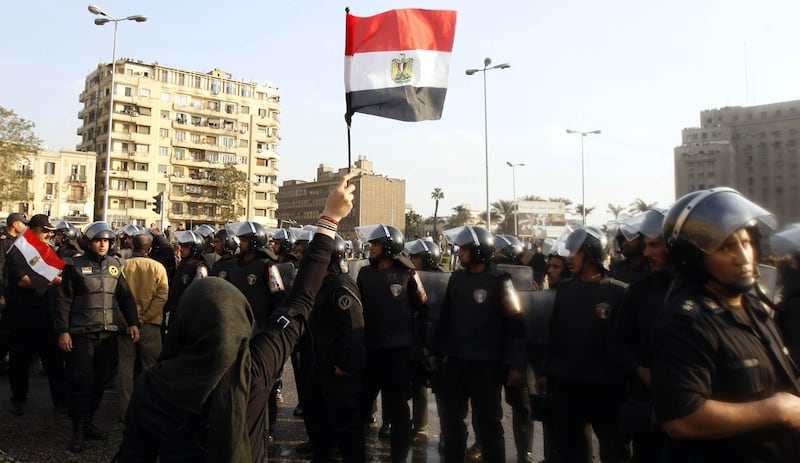Over the past year, I have been giving speeches about my latest book on Egypt’s revolutionary uprising of 2011 and the dissent it provoked among anti-progressive and autocratic forces who had worked assiduously to thwart the revolution.
I have been asked a number of times why I wrote that book, entitled A Revolution Undone, and one of the answers I often give is "annoyance". In short, annoyance at how a complex and multi-faceted history was being reduced to simplistic and crude sound bites, often by commentators who either did not speak Arabic or had not spent much time in Egypt, or both.
It is, alas, a source of annoyance that I harbour to this day, both towards Egypt and the region at large.
One would have hoped that most of the West would have at least attempted to see the Arab world through the eyes of its inhabitants, rather than through its own lens, by now. But all too often, we simply cannot be bothered to shift beyond the comfort zones of our own narratives, hampering our understanding of the region.
_________________
Read more from Opinion
[ Saudi crown prince banking on younger generation to help reforms succeed ]
[ Can Trump spare us a Cold War with China? ]
[ India may be open for business, but the hurdles are as high as ever ]
_________________
For example, many have claimed that Islam is in need of a "reformation" over the past few years, and especially in the last week, on the eve of the 500th anniversary of the Reformation of Christian Europe.
And yet, the fact that the need for an "Islamic reformation" has been taken as gospel (pun intended) in many western capitals does not make the lens to which contemporary Islamic thought has been subjected any less shallow and simplistic.
Europe's Reformation, for example, contained specificities that do not apply in the Arab world, including a deep opposition to science by the church, which was a deeply hierarchical and ecclesiastical institution in its nature. If none of that exists for Muslims, why would we, then, suggest that they are in need of one themselves?
Rather than look at Reformation-style processes, which had arisen from a wholly different context, would it not be more sensible to look at how Muslims contemporised their religion through the ages?
Would it not be more befitting to cast a glance at processes initiated by the likes of Al Ghazali or Al Shatibi, which led to creative and progressive mechanisms being the order of the day?
It is through such thorough and honest self-reflection that we can get to the root of the problems afflicting the Arab world's educational systems, which have been systematically weakened by colonialism, post-colonial restructuring and radicalism.
On the other hand, the issue with warning against the perils of pseudo-Orientalism is that these very words of caution are often excuses for being apologetic towards the major shortcomings plaguing the region.
Indeed, all too often, hostility towards foreign and external analysis is more about giving abuse, autocracy and cruelty a free pass.
“How dare you impose your Western, 'human rights-inspired' lens on us? We have our own ways of looking at fundamental freedoms,” I often hear. Such excuses are pitted against wholly legitimate criticism. That is not acceptable, either, and makes a mockery of the very notion of critique.
After all, constructive criticism serves to resolve problems through mechanisms suitable to each region. But we cannot allow progress to be measured by a yard stick defined by London, Washington, DC, or Paris any more than we can allow apologists to use opposition to pseudo-Orientalist thought as an excuse for inaction.
_________________
Read more from HA Hellyer
[ We shouldn't sensationalise the foreign fighter debate or strip nuance out of it ]
[ Muslim western communities must work harder to protect the vulnerable ]
[ Why are the region's biggest woes still not getting the attention they so desperately deserve? ]
_________________
On far too many occasions, in both the public and private spheres, offence at perceived bigotry in certain parts of the West is the go-to cover for avoiding genuine criticism.
How many times, for example, have supporters of autocracy (both from within and abroad) declared that the region isn't "ready" for change? The discourse essentially translates to: "They’re just Arabs. We can’t expect any better." In other words, abuses are to be expected and are, therefore, given an excuse. A former colleague of mine once put it quite simply as the "bigotry of low expectations".
Arabs can achieve wondrous things. There is no genetic predisposition against that, and there is a long historical record that shows that potential in spades.
To make such achievements a reality, the bar ought to be set high. And to reach this potential, indigenous self-reflection must be encouraged, not denigrated.
This should never be ignored in the name of some kind of parochialism. When poorly substantiated criticism (often underpinned by bigotry) prevails, it only makes the jobs of genuine critics that much harder.
It is only through the continual self-assessment and engagement with critique that societies grow, thrive and overcome their problems. Indeed, what makes genuine critique so very valuable is its ability to make that kind of future possible.





